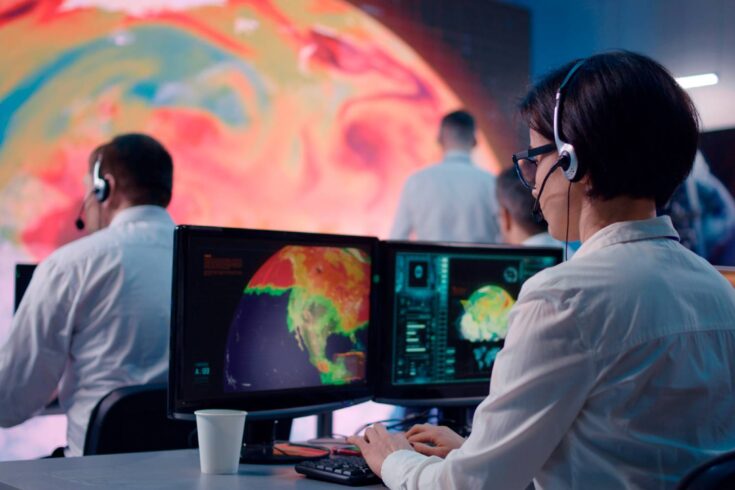Seven Natural Environment Research Council (NERC) centres and the Met Office will work together as the new UK National Climate Science Partnership (UKNCSP).
Recognising the urgency of meeting the goals of the Paris Agreement and UN Framework Convention on Climate Change, UKNCSP will play a leading role in developing an end-to-end climate strategy.
Professor Paul Monks, Chief Scientific Adviser for the Department for Business, Energy and Industrial Strategy (BEIS), will introduce the partnership today at the United Nations Climate Change Conference, COP26.
Professor Monks will outline how the Met Office and the seven NERC-supported research centres will combine their science research capabilities with universities across the country. He will explain how they will integrate the UK’s capabilities for monitoring, modelling and predicting climate change and its impacts.
Adapting to pressing challenges
The solutions-focused approach led by the UK’s major climate science organisations will support the government in developing and evaluating solutions to the challenges of mitigating and adapting to climate change.
The partnership will also work with the public and private sectors to ensure decision makers and businesses have access to the climate information they need. They will have to build resilience and adapt to the pressing challenges of the coming decades.
Dr Iain Williams NERC’s Director of Strategic Partnerships, said:
As the UK’s leading public funder of environmental science, our centres of expertise are essential to supporting policy and innovation that makes it possible for the environment, people and businesses to succeed together.
The new UKNCSP maximises investment to help ensure that the UK meets its net zero ambitions and, during the year of COP26, we remain a core part of international efforts to build our understanding of our environment and find solutions to climate change.
Developing technologies and modelling new approaches
As a priority, post-COP26, the UKNCSP will pool its partnerships’ resources to ensure aligned and integrated modelling and sustained observing programmes for the evolving global and UK climate.
The focus will also be on:
- enhancing the UK’s capability by extending observational and modelling approaches
- developing the use of new technologies, establishing major programmes of trans-disciplinary research
- providing training for a new generation of policy and decision-makers and expert intermediaries.
Professor Albert Klein Tank, Director of the Met Office Hadley Centre for Climate Science and Services, said:
Climate science needs to evolve to deliver to the new solutions agenda and this requires collaboration with experts in related science areas, as well as with practitioners in policy, planning and business.
There is an urgent need for a sustained, coordinated vision and investment in long-term observations and numerical models to answer how the climate is changing and why, what might happen next, what impacts may arise, and which solutions will be most effective.
A world-leading, strategic partnership
The seven NERC-supported research centres are:
- British Antarctic Survey
- British Geological Survey
- the National Centre for Atmospheric Science
- the National Centre for Earth Observation
- the National Oceanography Centre
- Plymouth Marine Laboratory
- the UK Centre for Ecology & Hydrology.
Professor Rowan Sutton, Director of Climate Science at the National Centre for Atmospheric Science, said:
At a time of rapid climate and technological change, the UKNCSP will enable a new solutions-focused approach by bringing together the UK’s major climate science organisations to deliver the climate information needed for climate solutions.
By pooling the power of the UK’s wide-ranging capabilities in climate observing and prediction, we can shape a world-leading, strategic partnership that is driven by policy and decision-making needs.
Further information
The National Oceanography Centre (NOC) is the UK’s leading institution for integrated coastal and deep ocean research.
The UK Centre for Ecology & Hydrology is a centre for excellence in environmental science across water, land and air.
The National Centre for Atmospheric Science is a world leading research centre, dedicated to the advancement of atmospheric science.
British Antarctic Survey (BAS) delivers and enables world-leading interdisciplinary research in the Polar Regions.
The National Centre for Earth Observation provides the UK with core expertise in Earth observation science, data sets and merging techniques, and model evaluation.
British Geological Survey (BGS) is a world-leading geological survey and global geoscience organisation
Plymouth Marine Laboratory is an international centre of excellence in marine science & technology.
Top image: Credit: EvgeniyShkolenko/Getty Images

